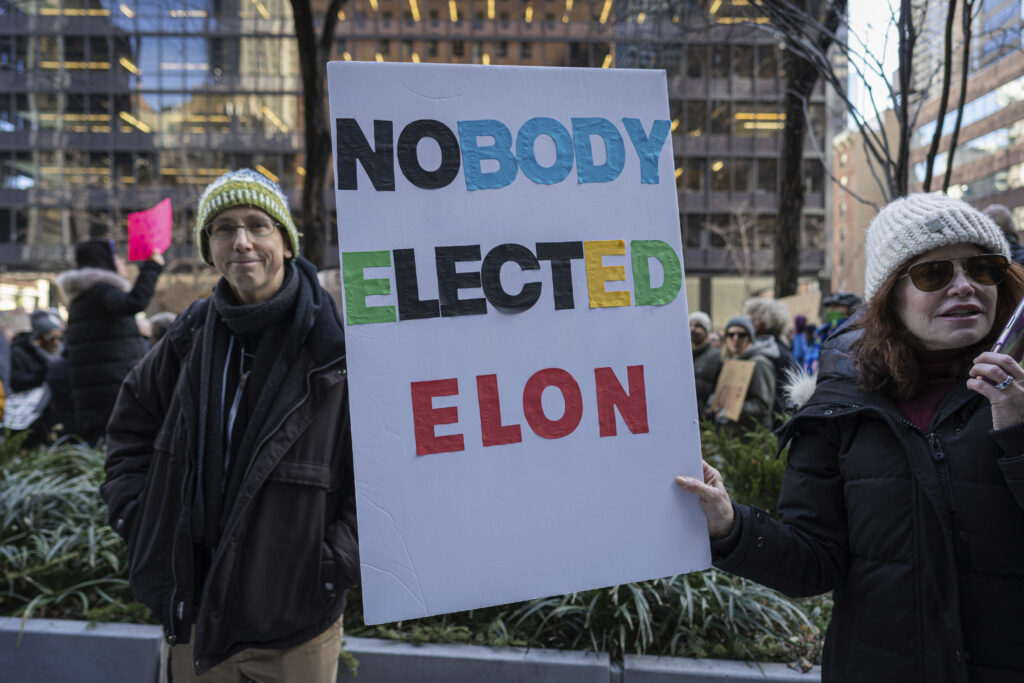The Legal Challenges to Elon Musk’s DOGE, Explained

Ever since President Donald Trump announced in November that he was creating something called the Department of Government Efficiency — cheekily shorthanded as DOGE — and it would be run by billionaire Elon Musk, it’s drawn intense skepticism and scrutiny.
For starters, a president can’t just create a new federal agency via executive order — that can only happen through an act of Congress. Then what is DOGE? In essence, what Trump did is rename the United States Digital Service — created within the Executive Office of the President under Barack Obama to improve all the federal and executive websites — into DOGE and retooled its mission to hunt down fraud and waste within federal agencies.
Naturally, chaos and uncertainty ensued. What authority does DOGE actually have? Are attempts to gain access to sensitive and classified data from federal agencies legal? And what can be done about it?
Can DOGE even exist?
The short answer is: We don’t know yet. The method of creating DOGE via executive order — and its authority — is the subject of a trio of lawsuits filed Jan. 20, the day Trump returned to the White House.
The three lawsuits — one filed by the progressive consumer rights advocacy group Public Citizen, another by the pro-democracy organization Democracy Forward and a third by public-interest firm National Security Counselors — allege that DOGE shouldn’t be considered a federal agency but rather an advisory committee. They argue that not setting up DOGE as an advisory committee violates the Federal Advisory Committee Act of 1972 which, among other requirements, states that all meetings are public record and that its membership be “fairly balanced” in its points of view.
The U.S. Department of Justice (DOJ) filed a motion to consolidate all three lawsuits, but otherwise, there’s been no movement.
DOGE Attacks the Education, Labor and Treasury Departments
In the meantime, DOGE continues to wreak havoc on the federal workforce. On Monday, personnel with DOGE requested sensitive personal information and financial information from the Department of the Treasury. In response, Public Citizen filed a lawsuit on behalf of two federal unions and a nonprofit organization to block DOGE from accessing the requested Treasury information.
“The scale of the intrusion into individuals’ privacy is massive and unprecedented,” the lawsuit said. “People who must share information with the federal government should not be forced to share information with Elon Musk or his ‘DOGE.’ And federal law says they do not have to.”
Until a federal judge rules on a motion for a preliminary injunction, the DOJ agreed to restrict DOGE Treasury access, save for two DOGE-affiliated special Treasury employees who were granted read-only access to payment records. Shortly after the agreement was reached, one of the DOGE-Treasury employees named in the order resigned after past racist social media posts were discovered.
A similar lawsuit was filed Wednesday by Democracy Forward — on behalf of a coalition of more federal unions — against DOGE to block access to Department of Labor (DOL) data. According to the lawsuit, some DOL staffers were ordered to give DOGE access to whatever they asked for, or risk losing their jobs.
“DOGE seeks to gain access to sensitive systems before courts can stop them, dismantle agencies before Congress can assert its prerogatives in the federal budget, and intimidate and threaten employees who stand in their way, worrying about the consequences later,” the lawsuit said.
Both the plaintiffs and the government struck a similar agreement to the one in the Treasury lawsuit, agreeing to block DOGE from accessing DOL data until a federal judge rules on the case, which is expected to come Friday afternoon.
“DOGE’s sweeping campaign to access highly-sensitive information and unilaterally dismantle federal agencies is unlawful and must be stopped,” Skye Perryman, President and CEO of Democracy Forward, said in a statement. “The Court must not allow DOGE to seize control of the highly sensitive, personal data held within the Department of Labor and Bureau of Labor Statistics. We will use every tool available to prevent this hostile takeover of yet another critical federal agency.”
On Friday, Public Citizen filed yet another lawsuit to block DOGE’s efforts to gain access to sensitive Department of Education (ED) data. The lawsuit said that DOGE’s access to information like student loans and financial aid data violates federal law — specifically the Administrative Procedures Act and the Privacy Act.
“The scale of the intrusion into individuals’ privacy is enormous and unprecedented,” the lawsuit said. “The personal data of over 42 million people lives in these systems. These are people who trusted ED with their sensitive personal information when they filled out the FAFSA and applied for federal student loans and grants, in reliance on the agency’s rules and other representations.”